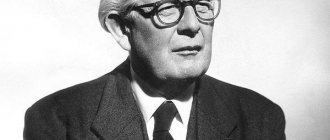3. Freud was the founder of the psychoanalytic school. He attached a major role in a person’s life to childhood. In his teaching, he argued that childhood leaves an indelible mark on a person. Experiences in early childhood have an impact on the character and psyche of the child, they can lead to problems with health and behavior.
Childhood, according to 3. Freud, is divided into several stages, which are determined depending on the greatest influence of a particular organ and psychosexual zones. 3. Freud believed that a person is born with a certain amount of energy, which sequentially goes through all stages in its development. He called the first three stages pregenital: oral, anal, phallic. They cover ages from birth to 5 years. The fourth, genital, phase in its development coincides with the time of puberty.
3. Freud often emphasized the determining role of the sexual instinct in human development. The sexual instinct develops from one erogenous zone to another during human growth. And at each stage, the main thing is a certain area of the body, the pleasant tension of which brings satisfaction. Depending on how this need was satisfied—in a state of frustration, in a normal state, or in an atmosphere of over-caring—the character of a person is determined. In case of frustration, the child’s psychosexual need does not find normal satisfaction. If the teachers are overprotective, the child is given little opportunity to manage his own needs.
Oral personality type
If the child had difficulties (excessive or insufficient stimulation in infancy, i.e. from birth to about 18 months, as well as when weaning from the mother's breast), then, most likely, an oral-passive type will be formed in the future. This type is characterized by a strong dependence on others, a passive attitude towards the surrounding reality. He constantly seeks support and approval from others. Usually this is a cheerful and optimistic person, trusting, with a childish soul. He is often either greedy or overly generous.
If a problem (meaning frustration or overprotectiveness) arose during the period when the child begins to develop teeth, as a result of which biting and chewing become an important form of expression of this state, then we have an oral-aggressive, or oral-sadistic, personality type. This type of personality is distinguished by cynicism, sarcasm, pessimism, a tendency to dominate and submit, to use other people in their own interests, i.e. such people often like to “ride” others.
Basic concepts of psychoanalysis
Here are a few fundamental ideas of psychoanalysis, to one degree or another, inherent in most psychoanalytic methods.
— A person’s behavior, the state of his psyche (consciousness) largely depend on internal unconscious motives, which are determined by LIBIDO or sexual desire (in the process of development, this position was repeatedly corrected or challenged by Freud’s followers).
— The main cause of psychological problems of the individual (neurotic behavior, depression, anxiety, complexes) is the inevitable conflict between unconscious impulses (desires) and the conscious part of the personality.
— A significant weakening of this conflict can be achieved through the individual’s awareness of the traumatic memories that cause the conflict, by releasing this material from the sphere of the unconscious and subsequent work with it through a psychoanalyst (living, analyzing, accepting the traumatic material).
— The human psyche has protective mechanisms that prevent awareness of the contents of the unconscious (main article — Psychological defenses of the individual).
Anal personality type
At the age of one and a half to three years, the child begins to be toilet trained, to the first forms of self-control, and depending on how this happens (under conditions of frustration or in an atmosphere of caring), two types of personality are obtained: anal-retaining and anal-pushing.
The anal-retentive personality type is characterized by stubbornness, stinginess, excessive neatness, and punctuality. He likes to plan his behavior to the smallest detail and does not like disorder and uncertainty.
The anal-thrust personality type is characterized by impulsiveness, a tendency to worry and destruction, and sometimes to cruelty.
Criticism of Freud's psychoanalytic theory
This is an extremely simplified interpretation of a very profound theory that has influenced many researchers in the field of psychology, as well as artists, writers, etc. Freud's theory has received considerable criticism, partly because it cannot be tested experimentally. This raises an important question for researchers, namely whether the theory can be falsified. This question was first raised in the works of Karl Popper, a philosopher who was particularly interested in the methodology of science. He believed that the correctness of a theory can only be proven if it is in principle possible to refute it, and this property of scientific theories is called falsifiability. Let's explain this with an example. Consider the theory that the Universe spontaneously appeared 3 seconds ago and will disappear 3 seconds later. This theory cannot be proven - you can claim to remember events that happened more than 3 seconds ago, or point to ancient historical monuments, but all these arguments are invalid because the facts you give could have happened during the spontaneous process of creation of the world . Likewise, if you look at your watch and 4 seconds later meaningfully declare that the world still exists, you still won't be able to disprove the theory - after all, the world may have just been created, and with it your memories of it. as you looked at your watch for 4 seconds. In short, this theory cannot be refuted. But for the same reasons it cannot be refuted, because it does not require experimental proof. But imagine if someone developed a (entirely plausible) theory that glasses thrown from the top of a skyscraper to the ground would break. This theory can be easily refuted - if many glasses are thrown from the roof (experimental sample) and most of them do not break, then this means that the theory is false. Similarly, we can conclude that if all or most of the glass breaks, then the theory is proven. In short, if it cannot be verified that consequences contradicting a given theory are impossible, then its correctness cannot be proven. psychological behavior freud training
From the point of view of the stated argument, Freud's theory is unprovable. Claims that early childhood experiences have a profound impact on a person's personality development are difficult to test simply because there is no scientific evidence of what these experiences actually were like. This is why Freudian psychotherapists help their patients explore their past, questioning them in detail and using various psychological training techniques aimed at releasing hidden feelings. They argue that although they are not conscious, they lurk in the subconscious and appear only in occasional slips of the tongue (Freudian slips) or in dreams that are interpreted to reveal their symbolic meaning. For example, some real thoughts (which may pose too great a threat to the patient's psyche) are considered unconscious and appear in symbolic form in dreams. For example, Freud believed that a patient often dreams of a giraffe because he is afraid of losing his penis.
To add to the above criticisms, Freud's theory was sexist. For example, he implies that women are “by nature” weaker individuals. In addition, some of Freud's patients reported that they were sexually abused by relatives as children. Freud generally considered these stories to be fantasies, but judging by modern data on the prevalence of child sexual abuse, he should have taken these complaints more seriously.
Phallic personality type
This type is formed when problems arise between three and six years of age associated with the emergence of children's interest in their new erogenous zones - the genitals, in the exploration of which he begins to show interest.
The phallic personality type is characterized by determination, persistence, assertiveness, self-confidence, turning into self-confidence, and determination. Men can be daring, boastful, their actions are often reckless, they strive for success, and their lives are spent constantly proving this success, often in love affairs like Don Juan. Women, like men, are prone to flirting, coquetry, have many men and, as it seems to them, all for love; they seem naive and innocent to themselves. Other women may acquire masculine character traits: persistence, determination, confidence.
Conclusion
The ongoing debate about the validity of Freud's theory of personality development should come as no surprise. It should come as no surprise that most people defend themselves against Freud's incriminating concepts. Freud himself believed that he was destined by fate to interrupt the “sleep” of humanity and tell them such an unpleasant truth about himself. As the great psychiatrist once told the writer Zweig, the main task of his theory is to teach a person to fight the “demon of irrationality”, while using the most rational principles of his mind.
Freud was very proud of his reputation as a “destroyer of illusions.” The product of his research work - psychoanalysis - became the main enemy of the deceitful politeness and secrecy of the society of that time. In 1930, in a letter to Albert Einstein, Freud wrote: “I no longer consider it one of my virtues that I always tell the truth whenever possible; it became my profession.”
Topics: Child psychology, Personal growth, For parents
Genital personality type
This is the period from maturity (puberty) to old age. The genital type is a balanced type in all respects, from the point of view of 3. Freud, an ideal type. A person of this type boldly faces facts, takes responsibility for himself and those around him, is active, takes care of loved ones, finds his place in society, works and has an active life position.
If in early childhood there was a situation associated with frustration or excessive care, then it can be very difficult for the individual to move to the genital type. Human development stops at the level where the situation associated with frustration or excessive care was recorded, and the more pronounced this situation was, the more difficult the transition to the last stage, or to the ideal personality.
| < Previous | Next > |
Skin vector.
general characteristics
- the color of greatest comfort is khaki
- geometry of greatest comfort - cross
- place in the quartile – outer part of the quartile SPACE, extrovert
- type of thinking – logical, building cause-and-effect chains.
Key task: separating your space from the outside world, preserving and accumulating resources. Species role: commander of a group of hunters. In peacetime: creator and keeper of food supplies. Possible disadvantages: excessive control over the situation, stinginess.
External signs
He is not tall. Ideal, athletic body type: slim, flexible, fit. The lips of a leathernist are thin, tightly compressed - the upper lip is practically invisible.
A skinny woman is thin, lean, beautiful, swift, agile, flexible like a cat. Only a woman with skin gracefully holds space in stiletto heels - she moves beautifully and quickly in high heels. The skin gait is fast and dancing. The leather worker has an excellent sense of rhythm.
The skin person needs to think about diets less than others, but all he does is change one diet to another. Having gained a couple of extra pounds, the skinner begins to invent more and more restrictive diets for himself.
Kozhnik prefers a strict, business-like style of clothing at work and a sporty style of clothing outside of work. For men, a mandatory part of their wardrobe is a tie; a skinny woman also often uses this piece of clothing in her wardrobe. Favorite skin hairstyle: hair pulled back into a tight ponytail.
A skin gesture is an index finger that can be used to point, threaten, edify.
A leather worker's skin is delicate, sensitive, ideal, velvety. At a certain state of the vector, it is the skinners who apply tattoos to their bodies and give themselves piercings.
Kozhnik is very dexterous and flexible: he always accurately calculates his movements in space: he went around, ran around, and didn’t hit anyone.
In addition to a flexible body, a leather worker also has a flexible psyche. Its distinctive feature is the possibility of a 180-degree turn: today I will assert and prove one thing, and the next day with the same conviction - the opposite; The only question is what is more profitable for me to say at the moment. This allows them to easily and quickly adapt to any changing conditions, be it a change of job, moving to another city or even to another country. And thanks to a good analytical mind, they quickly process information. Skin type people will always be able to find their niche in a new environment. They know how to evaluate benefits, strive to increase efficiency, know how to save time and money, and get great pleasure from it. Their favorite word is “no.” However, this does not prevent them from agreeing after a while, having come up with a reasonable excuse. Skin people are mostly secretive, rarely answer questions, and do not express emotions.
An internal sense of time and space allows them to successfully do several things at once. Leather workers are focused on success, including material success. Career, wealth, social status make up the system of value guidelines of a skin person. Only he knows the ambitions and desire to be a leader, because... he loves competition. It could be sports, competition in business or love.
Logic and logical thinking are also a distinctive feature of leather workers. In their speech you can often hear the phrases: “This is not logical! Where is the logic here? It would be logical to assume”, etc.
A child with the skin vector is very active, often disobedient. Caught in some kind of prank, he will be cunning and dodge. The right approach to education will allow a leather worker to become a successful businessman or engineer in the future.
Skin children who were constantly beaten and humiliated in childhood receive psychological trauma, adapting to this pain, and the body begins to release endorphins to drown it out. Gradually, the child gets used to this kind of effect, and then becomes dependent on it, receiving specific pleasure from it. This is how masochism arises. If such a person in adulthood does not receive the usual endorphins through physical pain in sexual life, then the desire to experience pain through social frustrations and failures appears. This is how a life scenario for failure develops, a person turns into an eternal loser.
Desired internal state: a feeling of being busy, the skinner is always in motion, in development, in changes and new information.
Role in society: breadwinner, organizer, middle manager, coordinator, defender.









